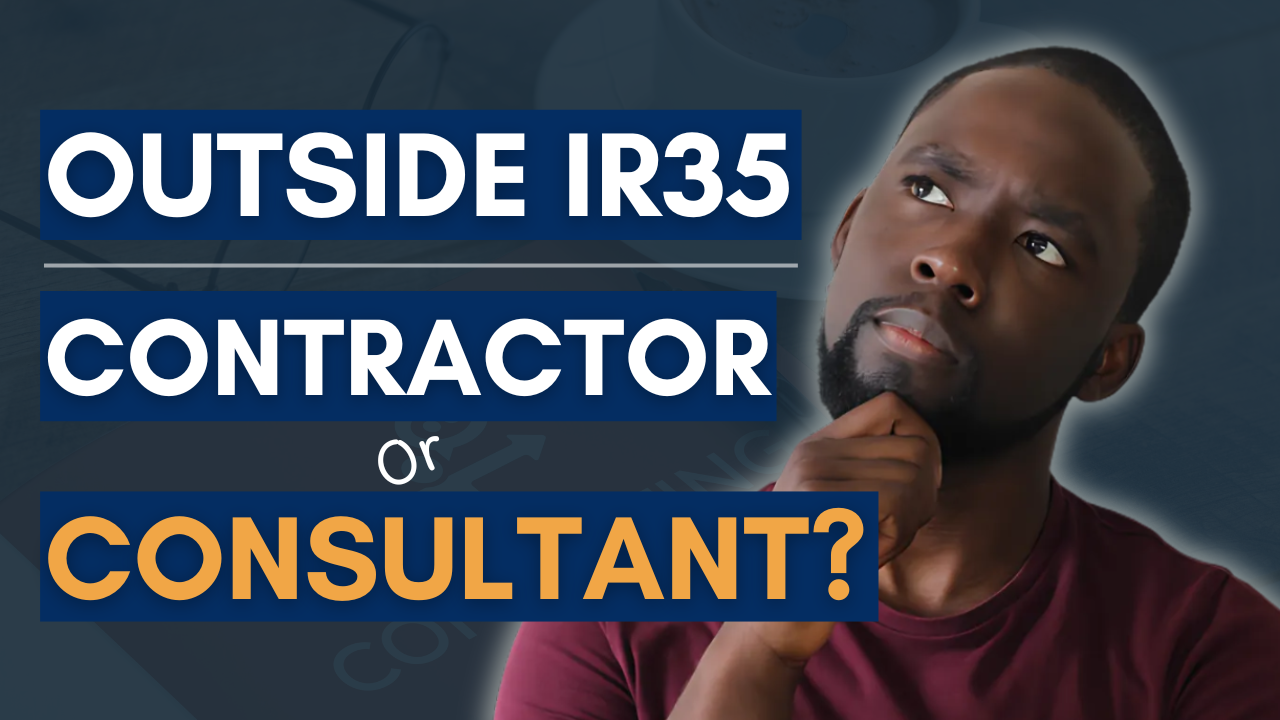Is Outside IR35 Really Consulting? Here’s What You Need to Know
Introduction
In this article, we’ll delve into the world of outside IR35 contracting, and whether it is secretly independent management consulting.
In the ever-evolving world of consulting, the IR35 legislation has created a clear divide. Understanding where you stand can define what you want to do with your portfolio career.
Let’s uncover the truth about consulting under IR35 and how to navigate it successfully.
1. The Basics of IR35?
I always like to cover the basics to remind people again, and again, and again, about what IR35 is. IR35, or Inland Revenue Notice 35, was designed to ensure individuals are taxed based on the “true nature” of their work. Here are the two categories:
- Inside IR35: HMRC taxes you as an employee, with PAYE applied.
- Outside IR35: HMRC taxes your business, subject to corporation and dividends tax (if you are taking dividends and not a salary).
Navigating this distinction is critical for consultants who want to remain genuinely independent. The latter qualifies you as independent, whereas the former does not. What defines an outside IR35 contractor is the following:
- You have genuine autonomy
- You are not managed
- You manage your own legal and financial risk
- You are not given resources to operate i.e. laptops and mobile devices
- You can take on subcontractors
- You can take on multiple contracts
If you cannot confidently say that you are, or can do these 6, then HMRC will naturally see you falling into the inside IR35 camp; even if you don’t satisfy just one of these criteria.
2. Consulting Under IR35
Consulting involves problem solving and providing expert advice and solutions in a specialised field. When thinking about IR35 the following can be thought of as a general rule of thumb
- Inside IR35: You function very similarly to an employee and can be replaced by permanent staff, and taxed as such. However, you do not get the same benefits and protections as permanent staff. The focus is on the nature of your work.
- Outside IR35: You’re a true consultant, engaged for specific projects and deliverables, and working independently without direct management. This type of contractor satisfies the 6 conditions, as well as the definition of a consultant.
As a reminder, true outside IR35 consultants:
- Use their own equipment and manage their work autonomously.
- Operate on project-based agreements.
- Assume financial risk through their limited company.
- Can work with multiple clients simultaneously, maintaining confidentiality.
Outside IR35 status represents true independence, allowing you to operate with freedom and take full control of your consulting career. Your protections lie within the contract written up between you and the client (and often a recruitment agent/consultancy if they have found you the opportunity).
In essence, the UK likes to call independent management consultants: Outside IR35 contractors. They are the same thing. They use the same skills as a firm consultant but aren’t tied to one. Typically these consultants have incorporated their own company, working either solo or opportunistically sub-contracting other contractors.
Many of these contracts are hard to find because public and private sector organisations do not want to be fined. This is because the government has said that if the IR35 status of a contractor is incorrect, the client organisation could be liable for fines; hence why they “just make” contractors inside of IR35. Contractors typically do not have strong protections in place to oppose incorrect decisions on their status in a contract.
For example, my contracting career started during the pandemic. The pandemic is gone now, yet the contracts I had were classified as inside IR35. If they truly were inside IR35 why did the need for my role disappear when the pandemic was ending? There is a strong case to say I should have been operating outside of IR35. I was none-the-wiser, and many contractors have fallen into this space.
3. Financial Implications
Finances are important to manage. As you know already, Inside IR35 requires PAYE tax contributions from both the contractor and the client, while outside IR35 allows consultants to benefit from efficiencies garnered from corporation and dividends tax. However, proper planning is crucial. I have always been advised to:
- Keep at least 35% of gross income for taxes.
- Whatever I take out as dividends (a bank transfer for my take-home pay that has been recorded as such), 10% of it must be kept in a separate account for dividends tax
- Work with a skilled accountant to stay compliant and maximise earnings.
These simple rules can help support you along your journey of consulting. For some reason it either takes a long time for this to register with contractors, or it is not explained very well by accountants. Don’t be afraid to pay for an accountant, and ask them a lot of questions, simplifying their “accountant speak” into everyday speak.
4. Navigating IR35
I think it is important to ensure that you do some activities to maintain competence and professionalism throughout your contracting journey. In my view, successfully navigating IR35 requires some of the following:
- Having IR35 insurance and professional liability and indemnity coverage. You can get this from companies such as Kingsbridge Contractor Insurance.
- Ensuring contracts reflect autonomy and deliverables. Look at your proposal and track deliverables on an Excel spreadsheet, Toggl or Notion as examples.
- Recording all milestones to prove independence (follow the same approach as above).
- Building a robust support network and staying informed. Keep in contact with old colleagues, previous contractors, recruiters, and hiring managers who may be able to unravel new opportunities in the market.
5. Building Your Brand
Your personal brand is your most valuable asset as an independent consultant. I like Daniel Priestley’s approach in relation to being a ‘Key Person of Influence’ as opposed to just a personal brand. Without getting into his philosophy too much (which you can check out here), here are some things to consider:
- Always show value in what you do. Be clear about your key expertise, articulating how you have done this in the past. How you pitch yourself sets you up from the beginning
- Showcase measurable successes on LinkedIn and your website. This is all about publishing things on your profiles and web pages. There will be static information that you publish, as well as regular information like content that aims to attract, educate, and empower people.
- As aforementioned, network strategically with peers and industry leaders. Connect with previous colleagues, contractors, and other professionals and partner with them to find out how you can find opportunities in the market. This could be via contracts, subcontracting, or procurement opportunities.
- Build a CV that highlights your expertise and follows recognised frameworks. I’ve previously spoken about my PAR ® model helping you articulate your value tangibly. This will help you think about your experience in a way that can be productised. You want to be able to deliver value in a repeatable way that can clearly be seen in your CV and portfolio.
- Finally, you want to be associated with the right people and organisations. How are you raising your profile? This is related to all previous points, but think about this area as the associations you keep. Here are examples of things that can raise your profile: testimonials, positive feedback, case studies, your portfolio of work, and well-known clients you have worked for. The theatrics of gaining awards and speaking engagements are nice for the ego but don’t evidence your value the same way some of these other things do (albeit people will be able to work out from your speaking engagement how much substance you have over time).
This is not exhaustive but hopefully gives you an idea of how you can start becoming a key person of influence within your field as an independent management consultant.
6. Future of Consulting
The consulting landscape is evolving. This is because the economy is changing. The world in the last 5 years has gone through rapid change including:
- Brexit
- The Covid-pandemic
- Moore’s Law and the doubling of computing power every 18-24 months
- The rise in interest rates and inflation
- Overconsumption of social media and online services due to the factors above
- The rise in AI and other megatrends disrupting economies
- The energy crisis due to wars
- Changes in socioeconomic, behavioural, and (geo-) political societal stances
All of these things (and more) create shifts in markets. Organisations now seek specialised expertise to adapt to changes in management and operations.
We have seen a change in the UK after the General Election where our government has moved from a more neo-conservative approach after 14 years, to one that could be seen as more neo-socialist. This has an effect on entrepreneurial opportunities which we have seen reflected in the Autumn Budget and fiscal policies. While regulations may tighten up, and opportunities may seem scarce, the demand for skilled consultants will always continue, creating opportunities for those who prepare.
During times when there is a government that wants to back public services, “working people”, and the state more, you only have to look at their policies and their fiscal plans to see where the opportunities lie. This is not a mystic ball, but there may be opportunities in:
- Great British Energy infrastructure, expertise, and development
- The Department of Health, and the NHS
- The Department of Education, and Teaching
- Local Government
- Training of staff to upskill and get Britain working again
- Security – especially as the world becomes more threatening
- Business management, legal, tech and finances
- Anything involving Capital investment and development
- Skills in that support these things i.e. Change Management, business analysis, Programme and Project management, delivery management, financial acumen etc. etc.
This does not dismiss other areas, I’m just highlighting some. The prime minister has said he wants to halve the consulting budget by half before the next term begins (4-5 years), but we will see what happens there.
Bonus Tip! Enhancing Your Consulting Practice
You need to be at the edge of innovation in your career. Staying competitive means embracing tools like generative AI (e.g. ChatGPT), Toggl, and Microsoft 365. Pursue certifications like Agile and PRINCE2 to demonstrate your expertise. And remember to leverage your network to secure high-value contracts, remaining ahead of industry trends.
If you don’t do things like this, you won’t even be in the race. You need to have a competitive advantage to stay relevant and find ways to be more efficient and more valuable. Naturally, this means being faster, novel, and unique. Keep on learning and explore opportunities for growth and improvement.
Key Takeaways
- IR35 defines your status as either an employee or an independent consultant.
- True independence is marked by autonomy, financial risk, and project-based engagements.
- Building a strong personal brand and staying informed on industry changes are essential to thriving under IR35.
Conclusion
IR35 may seem like a hurdle, but it’s also an opportunity to redefine and strengthen your consulting career. By understanding its implications, demonstrating your independence, and staying ahead of industry trends, you can thrive in today’s dynamic market.
Whether you’re looking to clarify your IR35 status or elevate your consulting practice, remember—your independence is your power.
Let’s embrace it together.







